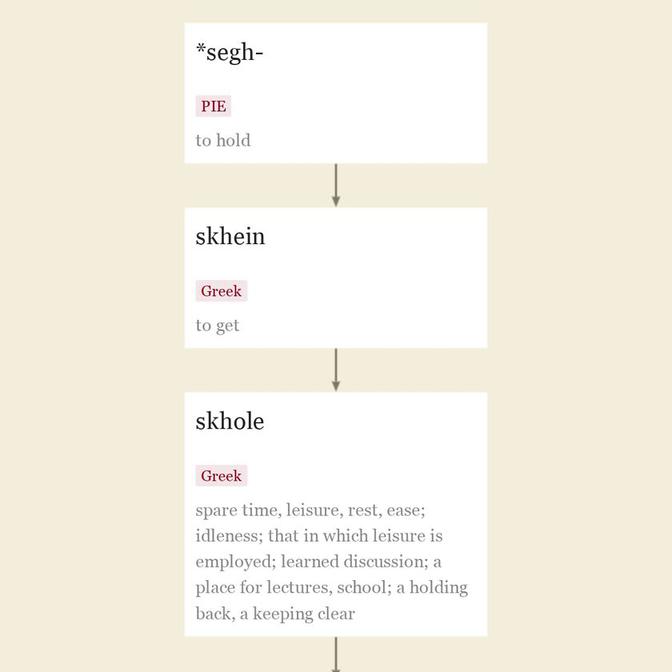Entries linking to schoolboy
mid-13c., boie "servant, commoner, knave" (generally young and male); c. 1300, "rascal, ruffian, knave; urchin," mid-14c. as "male child before puberty" (possibly extended from the "urchin" sense). A word of unknown origin.
Possibly from Old French embuie "one fettered," from Vulgar Latin *imboiare, from Latin boia "leg iron, yoke, leather collar," from Greek boeiai dorai "ox hides." (Words for "boy" double as "servant, attendant" across the Indo-European map — compare Italian ragazzo, French garçon, Greek pais, Middle English knave, Old Church Slavonic otroku — and often it is difficult to say which meaning came first.)
But it also appears to be identical with East Frisian boi "young gentleman," and perhaps with Dutch boef "knave," from Middle Dutch boeve, perhaps from Middle Low German buobe. This suggests a gradational relationship to babe. Another conjecture:
In Old English, only the proper name Boia has been recorded. ME boi meant 'churl, servant' and (rarely) 'devil.' In texts, the meaning 'male child' does not antedate 1400. ModE boy looks like a semantic blend of an onomatopoeic word for an evil spirit ( *boi) and a baby word for 'brother' ( *bo). [Liberman]
Used slightingly of young men in Middle English, also in familiar or contemptuous use of criminal toughs or men in the armed services. In some local uses "a man," without reference to age (OED lists "in Cornwall, in Ireland, in the far West of the U.S."). The meaning "male negro slave or Asian personal servant of any age" attested from c. 1600.
Extended form boyo is attested from 1870. Emphatic exclamation oh, boy is attested by 1917. Boy-meets-girl "typical of a conventional romance" is from 1945; the phrase itself is from 1934 as a dramatic formula. Boy-crazy "eager to associate with males" is from 1923.
A noticable number of the modern words for 'boy', 'girl', and 'child' were originally colloquial nicknames, derogatory or whimsical, in part endearing, and finally commonplace. These, as is natural, are of the most diverse, and in part obscure, origin. [Buck]
[place of instruction] Middle English scole, from Old English scol, "institution for instruction," from Latin schola "meeting place for teachers and students, place of instruction;" also "learned conversation, debate; lecture; disciples of a teacher, body of followers, sect," also in the older Greek sense of "intermission of work, leisure for learning."
This is from Greek skholē "spare time, leisure, rest, ease; idleness; that in which leisure is employed; learned discussion;" also "a place for lectures, school;" originally "a holding back, a keeping clear," from skhein "to get" (from PIE root *segh- "to hold") + -olē by analogy with bolē "a throw," stolē "outfit," etc.
The basic sense of the Greek word is "leisure," which passed to "otiose discussion" (in Athens or Rome, the favorite or proper use of free time), then it came to be used for the place for such discussion.
The Latin word was widely borrowed (in addition to Old French escole, French école, Spanish escuela, Italian scuola; Old High German scuola, German Schule, Swedish skola, Gaelic sgiol, Welsh ysgol, Russian shkola).
The meaning "students attending a school" in English is attested from c. 1300; the sense of "school building" is by 1590s. Sense of "people united by a general similarity of principles and methods" is from 1610s; hence school of thought (by 1848). As an adjective by mid-18c., "pertaining to or relating to a school or to education."
School of hard knocks "rough experience in life" is by 1870; to tell tales out of school "betray damaging secrets" is from 1540s. School-bus is from 1908. School days is from 1590s. School board "local committee of education" is by 1836; school district "division of a town or city for the management of schools" is by 1809.
Trends of schoolboy
More to Explore
updated on February 01, 2022
Dictionary entries near schoolboy
scholastic
scholasticism
scholiast
school
school-book
schoolboy
schooled
schoolgirl
school-house
schooling
schoolmarm

